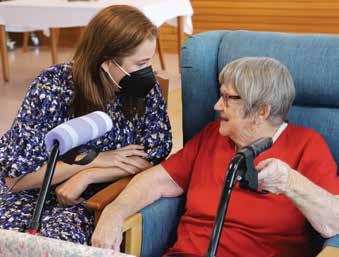
6 minute read
THE HON ANIKA WELLS MP
Minister for Aged Care and Minister for Sport
model for residential aged care to better match the costs of delivering care.
Advertisement
While we have achieved a lot of positive change in less than a year in government, there is still much to be done.
We have critical reforms to tackle over the next 12 months as we continue responding to the Royal Commission’s recommendations.
March 1 marks two years since the Royal Commission into Aged Care Quality and Safety’s final report was tabled in Parliament, a critical milestone in the journey to restoring dignity to older people in Australia.
This important milestone gives us the opportunity to reflect on what has happened since, and to look ahead to what needs to change.
In 2022, we implemented major changes to reform the aged-care system: We introduced Star Ratings for residential aged care, extended the Serious Incident Response Scheme to home care and improved transparency and accountability around home-care pricing and fees.
We also supported a wage increase for aged-care workers, capped home-care package fees, legislated 24/7 nurses and more care minutes in residential agedcare homes, and enabled a new funding
This is why it’s so important we talk to as many people as we can to make sure our aged-care system meets their current and future needs.
I have been visiting residential agedcare homes throughout the summer and meeting with older people and their families and carers, as well as aged-care workers and aged-care providers, to hear what they think about aged care.

Older people, along with their families and carers, are at the heart of these changes and I want to assure you: we are listening.
We are ambitious for aged care and I strongly encourage everyone to have their say.
Together we can make positive, lasting changes to aged care that deliver safety, dignity and respect for older people.
Care Reform) Act 2022 included the requirement for a registered nurse to be on site and on duty in every residential aged care home 24 hours a day, 7 days a week; a ban on exit fees and capping of administrative and management charges in the Home Care Packages Program (see opposite); as well as measures to allow greater transparency of information in relation to aged-care services, including approved providers and costs associated with residential aged care.
Pay rise for aged-care workers

The government is committed to supporting a real pay rise for Australia’s aged-care workers and will fund the Fair Work Commission’s decision of a 15 per cent interim pay rise for direct-care workers. This is one step in the right direction towards giving aged-care workers the respect and working conditions they deserve.
on the My Aged Care website. Star Ratings allow you to compare the quality of agedcare homes. Residential aged-care homes receive an overall Star Rating as well as ratings against four sub-categories:
• compliance
• residents’ experience
• staffing
• quality measures.
Find out more: myagedcare.gov.au/qualityaged-care.
Home Care Packages (HCP) pricing changes
The Government has taken significant steps to ensure older people will no longer be charged excessive administrative and management costs as part of their Home Care Packages.
From 1 January 2023, care management and package management charges are capped at 20 per cent and 15 per cent of the respective package levels.
This means more package funds will be available to meet the care needs of older people in Australia.
We are committed to giving care recipients better value for money and the choice and control to shop around.
Interim Inspector-General of Aged Care
Esteemed aged-care advocate Mr Ian Yates
AM (above) has been appointed as Interim Inspector-General of Aged Care and began the role in January. This position will review, monitor and report on the administration and governance of the aged-care system.
Star Ratings for aged-care homes
Star Ratings for aged-care homes are now available through the ‘Find a Provider’ tool
A reduction in administration and management charges means more money in the Home Care Package available to be used to pay for help around the house, personal and clinical care, assistive equipment, and other supports to stay safe and independent at home.
We have also banned exit fees, improving provider choice for care recipients, while stopping providers from charging separate brokerage and subcontracting fees.
More than 37,000 older people will no longer be charged for changing service providers or exiting the program.
These changes will make pricing clearer and easier to compare for Home Care
Package recipients.
What’s coming up
In addition to the actions outlined above, here are some of the things we’re working on now:
National Dementia Action Plan
The National Dementia Action Plan is a joint initiative between the Australian and state and territory governments. It is a 10-year plan to put people living with dementia, their families and carers at the centre of all action on dementia. We conducted public consultation on the plan and all feedback received will help shape the final National Dementia Action Plan, which will be finalised in 2023.
Boosting aged-care worker skills workers to care for older people at home. Expanding career opportunities nationally will increase home care in all locations, including in regional, rural and remote communities.
The future of in-home aged care
In-home aged care supports about 1 million older people in Australia. These services range from transport and house cleaning to clinical care, such as nursing and allied health.
Most people want to stay in their homes for as long as possible. It is vital that services are accessible and effective to support independence. That is why the Government is delivering a reformed in-home aged-care program from 1 July 2024 that is based on what we’ve heard from people who will use and deliver the services.
The proposed changes to in-home aged care aim to:
• make aged care simple to access and understand, with one assessment process
• give people timely access to the safe and high-quality services they need
• give people real choice and control in determining the services they receive
• have fair and transparent fees that direct funds to delivering high quality care.
We are boosting the skills of aged-care workers through training programs, scholarships, mentoring of new nurses and supporting clinical placements. Workers will be better skilled in areas such as dementia and palliative care, managing wounds, preventing falls, infection prevention and control, and supporting the mental health and wellbeing of older people.
Increasing the number of home-care workers

We are helping aged-care providers to recruit and train 13,000 new personal-care
The proposed model outlined in A New Program for In-home Aged Care discussion paper and summary brings together the existing in-home aged-care programs.
Older people who receive support through Commonwealth-funded aged-care programs will not lose any existing services under reforms to in-home aged care.
In the meantime, current in-home aged-care programs – Commonwealth Home Support Programme (CHSP), Home Care Packages (HCP), Short-Term Restorative Care (STRC) and Residential Respite – will continue operating as normal until 30 June 2024.
To read the discussion paper, visit: health.gov.au/resources/publications/anew-program-for-in-home-aged-carediscussion-paper.
Feedback from discussion paper
The department received more than 520 submissions from the consultation. Key feedback from older people, their families and carers included:
• many want to keep the ability for reimbursement with self-management
• care partners must support people and not be making decisions for them
• support for having a budget, and that prices and fees will be set by government
• support for access to additional services when needed, and a goods, equipment and home modifications scheme
• interest in how support in settings such as a home sharing model would work.
Have your say on aged care reform
Thousands of people have been involved in shaping the reforms so far through our surveys, webinars, online workshops, consultation papers and face-to-face events. There are still plenty of opportunities for you to have your say about the changes to aged care:
• Register to be kept up to date on consultation opportunities and outcomes or sign up to receive our monthly newsletter for older people in Australia –EngAged. Visit the Aged Care Engagement Hub: AgedCareEngagement.health.gov. au/get-involved.
• Call 1800 318 209 to find out more about the reforms and progress, open consultations and for assistance in completing consultation activities.
• Talk with us in person at one of the many
Sign up to become a CVS volunteer visitor: health.gov.au/cvs upcoming events around Australia that we’re attending, including:
– COTA Autumn Seniors Festival
Canberra, ACT 15 March 2023
– COTA Seniors Expo
Katherine, NT 16 March 2023
– Agfest – Carrick, TAS 4–6 May 2023
Access Carer Gateway Services
You can access Carer Gateway services in a number of ways:
Visit the website at carergateway.gov.au
Or call 1800 422 737 Monday to Friday between 8am and 5pm to speak with your local Carer Gateway service provider.
They will talk you through the registration process and start the planning process.
This process helps our staff learn more about you and your caring role so they can match services to your individual needs.
You can also ask someone to call you back at a convenient time.
For help with accessing emergency respite, call 1800 422 737 any time 24/7.
Ageing and Aged Care Group
Australian Government Department of Health and Aged Care Information correct as at the time of printing
We cansupport youwherever youwanttogo. OurSupport Workers canprovide youwith Social Support, Community Access andTransportAssistance to gooutand dothe things youenjoy. Thiscould include shopping, appointments. sportingactivitiesor to meet withfriends. Wewill support your goalsevery single day.
To findout more, contactus today!
Telephone088429 1200 Email hello@csisa.org.au Orviaourwebsite cslsa.org.au
Community




